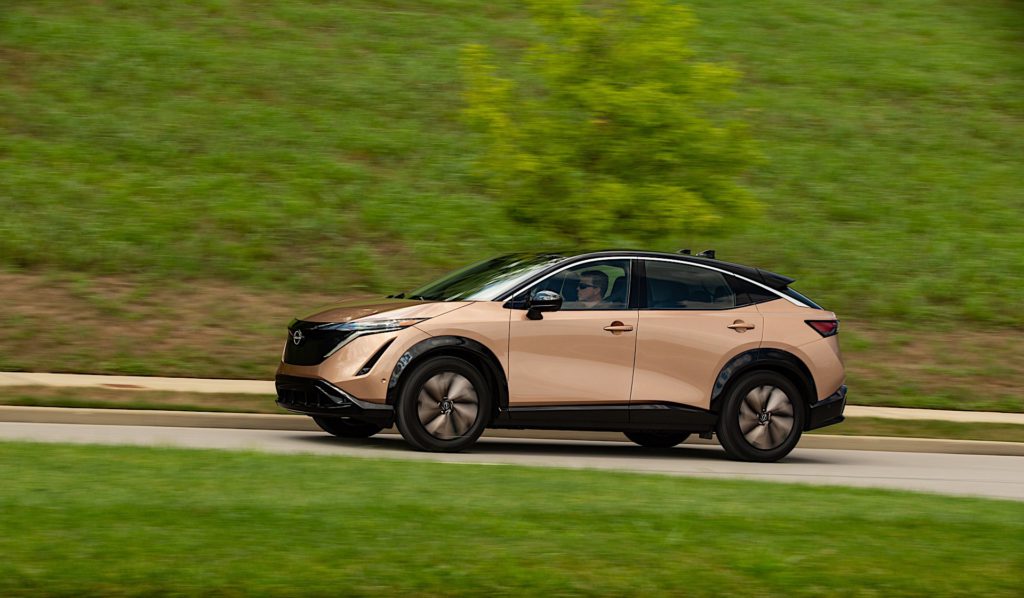Nissan, like practically every other automaker has big plans for electric vehicles. According to a news release outlining the company’s Ambition 2030 long-term strategy, “Nissan will introduce 23 new electrified models, including 15 new EVs by fiscal year 2030 aiming for an electrification mix of more than 50% globally across the Nissan and Infiniti brands.” New battery-powered vehicles in addition to the stalwart Leaf hatchback and recently introduced Ariya SUV will certainly help this automaker keep pace with rivals, but how can Nissan stand out from the crowd? Streamlining the purchase process and helping educate drivers could be key differentiators.
To hit these targets, the automaker has introduced two separate programs, one called Nissan@Home, which is designed to make the new vehicle purchase process far more convenient, and another, Second Delivery, to help educate drivers about some of the innovative features offered in Nissan EVs. For more information about these programs, EV Pulse caught up with Ted Kreder, Nissan’s senior manager of electric vehicle sales and strategy, at last week’s Chicago Auto Show.
SEE ALSO: Nissan unveils physical version of Max-Out convertible concept
“[As] we’ve seen the transition to EVs, we’ve also seen the transition of customers wanting to do the buying process from their house, online. So, we offer a product for that,” said Kreder. Call this the Amazon-ification of our lives, if you will. He explained the Nissan@Home program dramatically streamlines the vehicle purchasing process. You can reserve your car online, finalize the paperwork and then take delivery of the vehicle at a specified address. Overall, this sounds orders of magnitude more pleasant than spending hours and hours hanging out at a dealership, as nice as they are and as good as the free coffee may be.

To avoid running afoul of any franchise laws, all of this is still done through Nissan stores. “Customers are [still] purchasing the cars through dealers,” said Kreder. “Our dealers are very important to us, and we’ve invested a lot over the last decade with Leaf and continue to do so.” Catering to electric vehicle customers, around 900 of the automaker’s dealerships are already EV-certified, about 90% of the network. To earn this accolade, employees must receive specific training, service departments need special tools in order to maintain and repair Nissan’s electric offerings and – this is an important point – these stores also need to have a minimum number of on-site EV chargers.
Aside from digitizing the purchase process, Nissan is also striving to make sure drivers take full advantage of their new vehicles, especially EVs, which offer unique benefits but require some special care. “So, whether you purchase the car at the dealership or you had the car delivered to your house, you can schedule a ‘Second Delivery’ with either a Nissan salesperson or a third-party agent,” said Kreder. Those folks will happily come to your house and take you through some of the specific features that are unique to, say, the new Ariya “whether it’s ProPilot Assist 2.0, getting comfortable with that autonomous drive technology and hands-off drive mode, or even the other features within the car as you transition to EVs, like becoming more aware of the … preconditioning the battery for charging, charging times, things you can do to preheat the battery in colder temperatures” he explained. All of this is designed to “educate the customers throughout the entire process to ensure that elevated experience is met.”
CHECK THIS OUT: Honda’s upcoming CR-V-based, fuel cell-powered vehicle will support bi-directional charging
The company hasn’t been quite as vocal as some rivals, but an electric revolution is quietly brewing at Nissan, and it will be fascinating to see what products the automaker will introduce in the coming years. Of course, Kreder can’t comment on any of the EVs currently under development, he did say they’ve already announced two, new, lower-profile electric models will be assembled in the automaker’s Canton, Mississippi plant, products that are expected to launch by the middle of this decade. That factory is home to the Altima sedan, but a whole bunch of Frontier midsize and Titan full-size pickups are also bolted together there. This could indicate that Nissan is developing an all-electric truck (how cool would that be?), though this is pure speculation.
